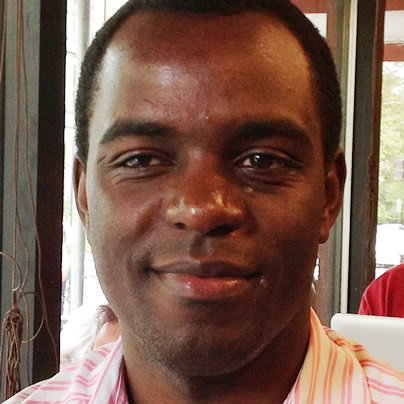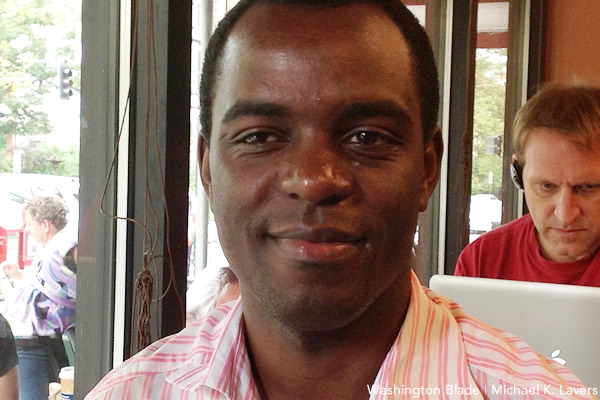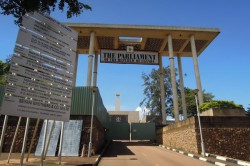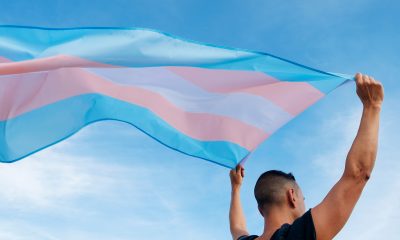World
Stolen document highlights homophobia in Uganda
‘If you don’t do something about your gay kid, he’ll end up in a grave with his guts hanging out’


Ugandan LGBT rights advocate Frank Mugisha blames American evangelicals for spreading homophobia in east Africa. (Washington Blade photo by Michael K. Lavers)
By THOM SENZEE
There is a surprising portrait in Uganda’s parliament building. It’s an oil-painted Idi Amin sporting a toothy smile and full military regalia. Amin poses while engaging in his trademark low-down, dual-fisted version of a fist pump.
Normally, it would be no surprise for a tourist to encounter a painting of a country’s former president inside the house of its legislature. But Amin was no ordinary president. He was a brutal dictator. He was allegedly a cannibal who literally ate his opponents and detractors for breakfast. The evidence for Amin’s cannibalism were the corpses of political foes found dangling by their Achilles tendons, after he was deposed, from meat hooks inside of a walk-in refrigerator at his compound.
Earlier this year a British journalist—let’s call him Ian Smith because, as you’ll see, disclosing his identity might preclude him from ever visiting Uganda again—went to the Chamber of Parliament in Kampala and took photos of some of the building’s more interesting features. The place was a ghost town at the time thanks to a special event where members of parliament were then gathered.
“That made it easy for me to steal the document,” recalls Smith.
The document he stole is titled: “Protect our young people from homosexuality: Debate and pass the anti-homosexuality bill now!”
Smith took the document from the Press Office at Parliament when the secretary wasn’t looking. It contains morbid images, such as one that may be posed or altered to depict a human figure lying on a bed with his or her intestines literally extruding onto a bed from his or her rectum.
The photo purports to be of a young man named Turyamureeba Wycliffe, who supposedly died from complications of “fisting” and tuberculosis (supposedly also brought on as a result of his homosexuality).
Mercifully and perhaps manipulatively, the document also includes a photo of Wycliffe in far happier and healthier days sitting in a decidedly effeminate posture. The juxtaposed imagery more subtly drives home the same point the brief hammers out in writing as, “Attention Ugandan MPs and parents: If you don’t do something about your gay (or gay-acting) kid, he’ll end up in a grave with his guts hanging out, just like this one did in Katungu Village.“
Uganda’s relatively newfound hatred for homosexuality is directly traceable to American missionaries who penetrated the country’s mindset by providing assistance in the fight against the east African AIDS epidemic.

A document obtained by the Blade was stolen from the Uganda Parliament’s pressroom and contains shocking claims about homosexuality. (Photo courtesy Thom Senzee)
Uganda, which not so long ago seemed equal to Kenya and South Africa as a symbol of hope that liberal democracies could flourish on the African continent, been indoctrinated into fervent homophobia by American evangelical diehards.
Their efforts have not only won followers in east Africa. Some argue the work of rightwing religious organizations with ties to people like former governors and Fox News celebrities, Mike Huckabee and Sarah Palin, has created a murderous environment for LGBT Ugandans.
David Kato, a Ugandan LGBT rights activist, was beaten to death after winning a lawsuit against a Ugandan magazine called “Rolling Stone” (no connection to the American publication of the same name) for publishing a list of names and photographs of 100 LGBT-rights leaders, calling for their execution. The article was a welcomed “calling out of perpetrators” for anti-homosexuality groups in Uganda, such as the Coalition for the Advancement of Moral Values (CAMOVA), which claims authorship of the aforementioned document, and the Family Life Network. While there is no proof that Kato’s death was connected to the magazine article, the New York Times reported that Kato “knew he was a marked man.”
However, Kato’s surviving friend, the officer of a group called Sexual Minorities-Uganda (SMUG), Frank Mugisha, makes no bones about American evangelicals’ role in creating a terrorized environment for lesbians, gays, bisexuals and transgender people in Uganda.
“Most of the propaganda can be traced to U.S evangelists,” he told the Washington Blade. “They have been the most visible in Uganda.”
But it wasn’t always this way, according to Mugisha, who in 2011 received the Robert F. Kennedy Award for Human Rights.
“The religious propaganda is traced back from the late ‘90s—especially in Uganda where missionaries came in to do HIV/AIDS work,” he said. “But they became more visible in 2000.”
Mugisha said the first time he saw the CAMOVA brief was when the Blade supplied it to him via email. He found it disgusting, but not surprising. In fact, he says, Uganda’s powerful, American-connected religious right has a firm grip on the ears of members of parliament.
“Our members of parliament go to church a lot. They interact with our church leaders. Politics in Uganda are centered around the church. So yes, the politicians unfortunately believe all these things.”
For journalist Ian Smith, the CAMOVA brief begged to be snatched for exposure in the media.
“I didn’t feel disgusted when I saw it sitting there in the press room,” Smith recalls. “I genuinely thought it was comical. Then, of course, you think more deeply into it and you realize, these people really believe this absurd rubbish.”
Multiple attempts to obtain comment about the document via the email address noted as contact information for the document’s author(s) yielded no response. Attempts to obtain reactions to the document from members of the Ugandan Parliament were also unsuccessful. According to Mugisha, there is little support for LGBT people among Uganda’s parliamentarians. But, he says, there is some.
“Yes there is,” he said. “But it’s very minimal; and most of the members of parliament are not comfortable giving us support in public. If they do support us they would rather it remains quiet.”
That means his and his colleagues’ work is lonely and dangerous. Most support comes from outside the country—from Americans and Europeans. What little support Sexual Minorities-Uganda gets from allies inside the country comes cloaked in secrecy.
“We do advocacy every day,” he says. “It happens at different levels. I spend half of my time in Uganda in meetings with different political leaders at all levels—from local leaders to national leaders. I lobby government, non-government organizations and civil society, trying to encourage them to work with SMUG.”
LGBT-rights advocates in Uganda and outside of the country blame the most recent, most radical and most violent anti-LGBT propaganda and homophobic activity in east Africa on a seminar organized by Ugandan Stephen Langa.
According to the New York Times, in 2009, Langa invited three prominent American evangelical Christian ministers to speak to Ugandan parents about the supposed threat of recruitment of their children by leaders of the so-called homosexual agenda for all kinds of terrible purposes.
At least one of the three was associated with discredited and recently shuttered “conversion-therapy” purveyor, Exodus International.
Another of the American evangelists blamed for setting in motion Uganda’s anti-gay hysteria with the 2009 seminar, entitled “Exposing the Homosexuals’ Agenda,” is Scott Lively.
Lively is author of a “gay-proofing” book for parents who fear having a gay child, which has been panned by mainstream psychology practitioners as “psychobabble” and “quackery.”
Mugisha says LGBT people in his country still live in constant fear and danger as a result of the seminar held more than four years ago.
“What I can say is that the Family Life Network and the anti-gay groups in Uganda have spread so much propaganda, which in turn has caused fear within the Uganda people,” he said. “This fear has brought hatred toward known and openly gay persons in Uganda, hence increasing the homophobia and hate crimes.”
The good news is that the anti-homosexuality bill, which the CAMOVA brief implored the Ugandan Parliament to pass last year, has not passed. If it had passed in its original form, homosexuality would have been punishable by death (the law was later rewritten to specify life in prison as the penalty for some convictions of homosexuality).
Further good news, according to Ian Smith, is the possibility that even the document presented to MPs by the homophobic Coalition for the Advancement of Moral Values in December 2012 may itself represent a silver lining of sorts.
“You would have thought all of their work of sewing hate was well done by now,” says Smith. “You wouldn’t think they would feel the need to go to such lengths as creating and passing about such a load of rubbish as this document.”
Perhaps, he says, the document in question is a sign of a cracking at the seams of the anti-homosexuality lobby in Uganda.
“Clearly there’s a feeling among them that they have not succeeded in convincing people that gay people are bad for Uganda.”
Was there ever a time in east Africa when LGBT people could live without fear of harassment, beatings and murder? According to Mugisha, there were indeed far better times.
“I would say all the way back before the British came and colonized us,” Mugisha said. “LGBT people were free. But more recently, before the coming of the evangelicals—especially the U.S. evangelicals.”
Recent events notwithstanding, Mugisha is hopeful about Uganda’s future.
“With the dialogue now and people talking about gay rights, we hope that things will change,” he said.
Even without passage of the anti-homosexuality law, homosexual acts are still against the law in Uganda, though Mugisha remains optimistic that change is coming.
“I think that there is a possibility that homosexuality will be decriminalized soon,” said Mugisha. “And the sodomy laws may be removed.”
Until then, Mugisha and myriad others in Uganda and across east Africa simply focus on surviving while working for change.
“SMUG can exist,” he said. “We are doing nothing illegal [and] we can exist in Uganda as an association. But we have to be careful. As an openly gay man, I can exist. But also, I have to be careful and take precautions some times.”
CAMOVA Anti-homosexuality Brief Uganda – Washington Blade exclusive
Senegal
A dozen Senegalese men arrested for ‘unnatural acts’
Popular journalist and musician among those taken into custody

Senegalese police have charged a dozen men with committing “unnatural acts.”
The New York Times reported Pape Cheikh Diallo, a popular television reporter, and Djiby Dramé, a musician, are among the men who authorities arrested. They appeared in court in Dakar, the Senegalese capital, on Monday.
Le Soleil, a Senegalese newspaper, reported authorities arrested the men on Feb. 6 “for intentional transmission of HIV, unnatural acts, criminal conspiracy, and endangering others.” The newspaper further notes the men have been placed in “pre-trial detention.”
Senegal is among the countries in which consensual same-sex sexual relations remain criminalized.
Police in Kaolack, a town that is roughly 135 miles southeast of Dakar, in 2015 arrested 11 people who allegedly engaged in same-sex sexual acts during “a celebration of a gay marriage.” The National Assembly in 2021 rejected a bill that would have further criminalized homosexuality in the country.
Philippines
Philippines Supreme Court rules same-sex couples can co-own property
Advocacy group celebrated landmark decision

The Philippines Supreme Court in a landmark ruling said same-sex couples can co-own property under the country’s Family Code.
The Philippine News Agency on Tuesday notes the court issued its ruling in the case of two women who bought a house in Quezon City, a suburb of Manila, the Filipino capital, before they broke up.
The two women, according to the Philippine News Agency, “agreed to sell the property” after they ended their relationship, “and the registered owner — the respondent — signed a document acknowledging that the other partner paid for half of the purchase and renovations.” The Philippine News Agency notes “the registered owner” later “refused to sell the property and withdrew her earlier acknowledgment of co-ownership, prompting the other partner to file a complaint.”
A Regional Trial Court and the Philippines Court of Appeals ruled against the plaintiff.
The Supreme Court in a 14-page ruling it issued on Feb. 5 overturned the decisions. The Supreme Court published its decision on Tuesday.
“Considering that there is co-ownership between petitioner and respondent, then each co-owner may demand at any time the partition of the thing owned in common, insofar as her share is concerned,” said the Supreme Court in its ruling, according to the Philippine News Agency. “Having rightful interest over the subject property, petitioner has the right to demand the division of the subject property.”
The predominantly Catholic country’s Family Code defines marriage as “a special contract of permanent union between a man and a woman entered into in accordance with law for the establishment of conjugal and family life.” It also states in Article 148 that “in cases of cohabitation” outside of marriage, “only the properties acquired by both of the parties through their actual joint contribution of money, property, or industry shall be owned by them in common in proportion to their respective contributions.”
“In the absence of proof to the contrary, their contributions and corresponding shares are presumed to be equal,” it reads.
The BBC reported the Supreme Court ruling states this provision “applies to all forms of co-habitation,” regardless of the couple’s gender. A Supreme Court press release indicates the decision notes lawmakers and the Filipino government “must address same-sex couples’ rights, as courts alone cannot resolve all related policy concerns.”
“This court does not have the monopoly to assure the freedom and rights of homosexual couples,” it reads. “With the political, moral, and cultural questions that surround the issue concerning the rights of same-sex couples, political departments, especially the Congress must be involved to quest for solutions, which balance interests while maintaining fealty to fundamental freedoms.”
LGBT Pilipinas, a Filipino advocacy group, welcomed the ruling.
“This ruling marks a monumental step forward in the legal recognition of LGBTQ+ families and relationships in the country,” it said in a statement.
LGBT Pilipinas added the ruling “lays a crucial legal foundation for broader recognition of same-sex relationships and strengthens the push for comprehensive anti-discrimination protections.”
“This is a win not only for the LGBTQ+ community, but for fairness and justice in Philippine society as a whole,” said the group.
Italy
Olympics Pride House ‘really important for the community’
Italy lags behind other European countries in terms of LGBTQ rights

The four Italian advocacy groups behind the Milan Cortina Winter Olympics’ Pride House hope to use the games to highlight the lack of LGBTQ rights in their country.
Arcigay, CIG Arcigay Milano, Milano Pride, and Pride Sport Milano organized the Pride House that is located in Milan’s MEET Digital Culture Center. The Washington Blade on Feb. 5 interviewed Pride House Project Manager Joseph Naklé.
Naklé in 2020 founded Peacox Basket Milano, Italy’s only LGBTQ basketball team. He also carried the Olympic torch through Milan shortly before he spoke with the Blade. (“Heated Rivalry” stars Hudson Williams and Connor Storrie last month participated in the torch relay in Feltre, a town in Italy’s Veneto region.)
Naklé said the promotion of LGBTQ rights in Italy is “actually our main objective.”
ILGA-Europe in its Rainbow Map 2025 notes same-sex couples lack full marriage rights in Italy, and the country’s hate crimes law does not include sexual orientation or gender identity. Italy does ban discrimination based on sexual orientation in employment, but the country’s nondiscrimination laws do not include gender identity.
ILGA-Europe has made the following recommendations “in order to improve the legal and policy situation of LGBTI people in Italy.”
• Marriage equality for same-sex couples
• Depathologization of trans identities
• Automatic co-parent recognition available for all couples
“We are not really known to be the most openly LGBT-friendly country,” Naklé told the Blade. “That’s why it (Pride House) was really important for the community.”
“We want to use the Olympic games — because there is a big media attention — and we want to use this media attention to raise the voice,” he added.

Naklé noted Pride House will host “talks and roundtables every night” during the games that will focus on a variety of topics that include transgender and nonbinary people in sports and AI. Another will focus on what Naklé described to the Blade as “the importance of political movements now to fight for our rights, especially in places such as Italy or the U.S. where we are going backwards, and not forwards.”
Seven LGBTQ Olympians — Italian swimmer Alex Di Giorgio, Canadian ice dancers Paul Poirier and Kaitlyn Weaver, Canadian figure skater Eric Radford, Spanish figure skater Javier Raya, Scottish ice dancer Lewis Gibson, and Irish field hockey and cricket player Nikki Symmons — are scheduled to participate in Pride House’s Out and Proud event on Feb. 14.
Pride House Los Angeles – West Hollywood representatives are expected to speak at Pride House on Feb. 21.
The event will include a screening of Mariano Furlani’s documentary about Pride House and LGBTQ inclusion in sports. The MiX International LGBTQ+ Film and Queer Culture Festival will screen later this year in Milan. Pride House Los Angeles – West Hollywood is also planning to show the film during the 2028 Summer Olympics.
Naklé also noted Pride House has launched an initiative that allows LGBTQ sports teams to partner with teams whose members are either migrants from African and Islamic countries or people with disabilities.
“The objective is to show that sports is the bridge between these communities,” he said.
Bisexual US skier wins gold
Naklé spoke with the Blade a day before the games opened. The Milan Cortina Winter Olympics will close on Feb. 22.
More than 40 openly LGBTQ athletes are competing in the games.
Breezy Johnson, an American alpine skier who identifies as bisexual, on Sunday won a gold medal in the women’s downhill. Amber Glenn, who identifies as bisexual and pansexual, on the same day helped the U.S. win a gold medal in team figure skating.
Glenn said she received threats on social media after she told reporters during a pre-Olympics press conference that LGBTQ Americans are having a “hard time” with the Trump-Vance administration in the White House. The Associated Press notes Glenn wore a Pride pin on her jacket during Sunday’s medal ceremony.
“I was disappointed because I’ve never had so many people wish me harm before, just for being me and speaking about being decent — human rights and decency,” said Glenn, according to the AP. “So that was really disappointing, and I do think it kind of lowered that excitement for this.”



















